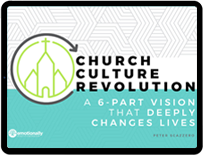Creating a healthy church culture is indispensable to multiplying deeply transformed disciples and leaders. In this podcast series, I expand on the six characteristics of what this culture looks like. Last week, I looked at a slowed down spirituality. This week I explore integrity in leadership: Slowed-Down Spirituality Integrity in Leadership Beneath-the-Surface Discipleship Healthy Community Passionate Marriage and Singleness Every Person in Full-Time Ministry This podcast digs into a number of critical themes related to integrity. We begin by looking at integrity as a continuum, i.e. something that we are continually growing in through our lives. (I share my own long journey as an example). Then we examine what it means to guard the integrity of the ministry, church, organization, or family we lead. And finally, I offer a few pointers on practical ways to raise the level of your own integrity that will inevitably impact those you lead. Remember: When we have integrity. Read more.
One of the greatest insights I’ve gained from working with thousands of churches around the world is that creating a healthy church culture is indispensable to multiplying deeply transformed disciples and leaders. To help you begin thinking about what this might look like in your own church, I’ve identified six characteristics or marks of what we call today, an emotionally healthy church culture: Slowed-Down Spirituality Integrity in Leadership Beneath-the-Surface Discipleship Healthy Community Passionate Marriage and Singleness Every Person in Full-Time Ministry In this podcast, I explore the first and most important characteristic of this culture – a slowed down spirituality. This is a church culture where people refuse to allow a hurried world to set the pace for their lives. Instead they choose to live by rhythms that are slower and more deliberate. They set aside time each day to immerse themselves in Scripture, silence, and solitude, which are foundational practices for their communion. Read more.
The Church needs more than a vision of what we’re doing. We need a vision for who we are becoming. In this free E-book, you’ll discover six keys for growing a healthy church culture. Imagine a church where… Each person is able to slow down their pace to be with Jesus, and this is the source from which their activity flows. Leaders do not pretend to be something on the outside that they are not on the inside. Every member is growing in self-awareness and experiencing transformation “beneath the surface” of their lives. Each person is committed to learning tools and practices in order to love others like Jesus. We model God’s passionate love for the world by living out of our marriages or singleness. We commission every believer to walk in the authority of Jesus at work and in daily life. Ready for a New Vision? Download Your Free Ebook
Living with integrity, whether you are in your twenties or seventies, is no small task. In this podcast, I lay the foundation for a leader’s integrity by discussing four critical areas: 1. Integrity with God. Throughout church history, one of the seven deadly sins was described as sloth. This referred not just to laziness, but to busyness with the wrong things. We are overly active because we cannot bear the effort demanded by a life of solitude with God. The Desert Fathers had no patience for activism, even godly activity, unless it was nourished by a rich interior life with God. They repeatedly warned about being engaged in activity for God before the time is ripe. 2. Integrity with Yourself. Leadership in the church can do violence to your soul. When we give to others out of our emptiness, we are of little value to those we serve. One of our greatest challenges is. Read more.
The McDonald’s leadership model was talked about so much in the evangelical leadership culture in which I was nurtured that I was stunned watching the movie The Founder. The movie tells the story of Ray Kroc and the history of McDonald’s – a company now worth over $100 billion with 36,899 stores in 120 countries. McDonald’s, I was told repeatedly, offered a model to grow our churches – simple, scalable, clearly branded, and entrepreneurial. Sadly, we never talked about the shadow side of McDonald’s history. The Founder does. As I watched the movie, I was reminded of the ancient proverb quoted by Os Guiness many years ago: if you are going to dine with the devil, you better have a long spoon. The Founder stars Michael Keaton as Ray Kroc who meets Mac and Dick McDonald as they are running a successful burger operation in 1950s Southern California. He sees the franchise potential. Read more.
Last week, I explored the 5 top challenges for being an emotionally healthy leader: remaining in deep loving union with Jesus, taking time to grow in high self-awareness, embracing limits, choosing brokenness and vulnerability, and remaining a lifelong learner. This week, I want to you to consider the 5 remaining top challenges we consistently face as leaders: 6. Organizational Integrity. Exercising power and setting wise boundaries in leadership is complex, especially when we add in the “God factor.” Dual relationships, clear expectations and job descriptions, hiring and firing (even of volunteers) all require skill and high differentiation. Antidote: Include a wise, outside consultant into your process. Seek counsel from mentors who have led healthy ministries. Master the 8 skills from The Emotionally Healthy Relationship Course in your own life so you can apply them in your ministry. And carefully study chapter 8, “Power and Wise Boundaries,” from The Emotionally Healthy Leader. 7. Truth. Spirituality is not an. Read more.





